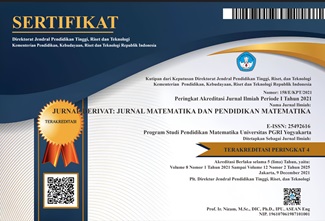Upaya Meningkatkan Kemampuan Komunikasi Matematika Melalui Model Kooperatif Tipe Think Pair Share (TPS)
DOI:
https://doi.org/10.31316/j.derivat.v4i1.235Abstract
Penelitian ini bertujuan mendeskripsikan pelaksanaan Model Pembelajaran Kooperatif tipe Think Pair Share (TPS) untuk meningkatkan kemampuan komunikasi matematika siswa kelas VII E SMP N 2 Pajangan. Penelitian ini dilakukan di SMP N 2 Pajangan, dengan subyek penelitian kelas VII E yang berjumlah 28 siswa. Jenis penelitian adalah penelitian tindakan kelas (PTK) kolaboratif antara guru matematika kelas VII E SMP N 2 Pajangan dengan peneliti. Teknik pengumpulan data yang digunakan ialah observasi, dokumentasi, wawancara, catatan lapangan dan tes. Data hasil penelitian dianalisis secara deskriptif kualitatif dan kuantitatif. Hasil penelitian ini menunjukkan bahwa setelah diterapkan pembelajaran matematika dengan model pembelajaran kooperatif tipe Think Pair Share (TPS) pada materi sifat-sifat bangun segiempat dan keliling serta luas bangun segiempat, siswa mengalami peningkatan kemampuan komunikasi matematika.
Â
Kata Kunci: Komunikasi matematika, model pembelajaran Kooperatif tipe Think Pair Share (TPS)Downloads
Published
Issue
Section
Citation Check
License
Authors who publish with this journal agree to the following terms:
-
Authors retain copyright and grant the journal right of first publication with the work simultaneously licensed under a Creative Commons Attribution-ShareAlike 4.0 International License that allows others to share the work with an acknowledgment of the work's authorship and initial publication in this journal.
- Authors are able to enter into separate, additional contractual arrangements for the non-exclusive distribution of the journal's published version of the work (e.g., post it to an institutional repository or publish it in a book), with an acknowledgment of its initial publication in this journal.
- Authors are permitted and encouraged to post their work online (e.g., in institutional repositories or on their website) prior to and during the submission process, as it can lead to productive exchanges, as well as earlier and greater citation of published work (See The Effect of Open Access).







